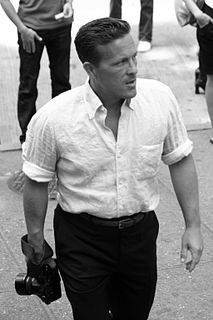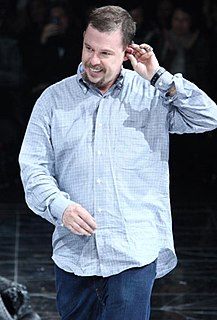A Quote by Jean Paul Gaultier
When I first started to do fashion shows I didn't have the budget to hire top models so I would cast women who inspired me, and ask them to walk how they walked. I was doing a mise en scène, which for me was normal. I love for people to see my clothes, but it was more about the attitude of the girls. The revues of the late 19th century/early 20th century were very much a reflection of what was happening in society and politics, and for me that is also the role of the fashion designer.
Quote Topics
About
Also
Ask
Attitude
Budget
Cast
Century
Clothes
Designer
Doing
Early
Fashion
Fashion Design
Fashion Designer
Fashion Show
First
Happening
Hire
How
Inspired
Late
Love
Me
Models
More
Much
Normal
People
Politics
Reflection
Role
See
Shows
Society
Started
Them
Top
Top Model
Very
Walk
Walked
Were
Which
Women
Would
Related Quotes
I was really interested in 20th century communalism and alternative communities, the boom of communes in the 60s and 70s. That led me back to the 19th century. I was shocked to find what I would describe as far more utopian ideas in the 19th century than in the 20th century. Not only were the ideas so extreme, but surprising people were adopting them.
I just walk how I walk. But I am also really inspired by the physical drama in silent films from the beginning of the 20th century - it's ice cold and unreachable, like the stare of a sniper! I guess this look is something new that I brought into the world of fashion: a dark and dramatic, 19th century Russian literature and drama inspired look.
People have asked me about the 19th century and how I knew so much about it. And the fact is I really grew up in the 19th century, because North Carolina in the 1950s, the early years of my childhood, was exactly synchronous with North Carolina in the 1850s. And I used every scrap of knowledge that I had.
If you look back on the history of the 20th century, the 19th century or even to the ancien régime of the 18th, you will see that first people rebelled against the order of the things because of lack of liberty, and demanded more freedom. And when they got more freedom, they got frightened, and they desired more security for a change. After a while, they started complaining, although more secure, they also become more dependent and rule-bound.
I'm very interested in fashion shows. For me they're at the center of everything. What happens on the side, that's the energy - it's fashion week - but fashion shows are at the heart of it. I function more like a stylist. I'm inspired, and then I try to find it on the street. What's great about a blog is that you can do completely crazy things like take the moustache shoes Marc Jacobs did for Louis Vuitton for spring and talk about what that has to do with moustaches. In fashion, what people are looking for is inspiration and new ideas all the time.
I love going to the runway shows. It's not so much for me a shopping trip as it is the appreciation of the craft of these design geniuses who come up with beautiful color combinations and beautiful proportion suggestions and these kind of ideas, so I look at the runway shows in very different ways, just kind of a romantic artistic interpretation of how they would like to see fashion going forward, but for me it's much more abstract. The runway shows are much more abstract than you know what ends up on people is much more real to me.
In the 19th century, when Muslims were looking at Europe as an example, they were independent; they were more self-confident. In the early 20th century, with the fall of the Ottoman Empire, the whole Middle East was colonized. And when you have colonization, what do you have? You have anti-colonization.
Some designers are so airy-fairy people can't connect with them. I hope people can relate to me, to a normal person who just happens to be a fashion designer, that people can take me as they find me. It's not the designer's job to care about what people think. Whatever else I've done, I've never tried to be something that I'm not.
More girls were killed in the last 50 years, precisely because they were girls, than men killed in all the wars in the 20th century. More girls are killed in this routine gendercide in any one decade than people were slaughtered in all the genocides of the 20th century. The equivalent of 5 jumbo jets worth of women die in labor each day... life time risk of maternal death is 1,000x higher in a poor country than in the west. That should be an international scandal.








































